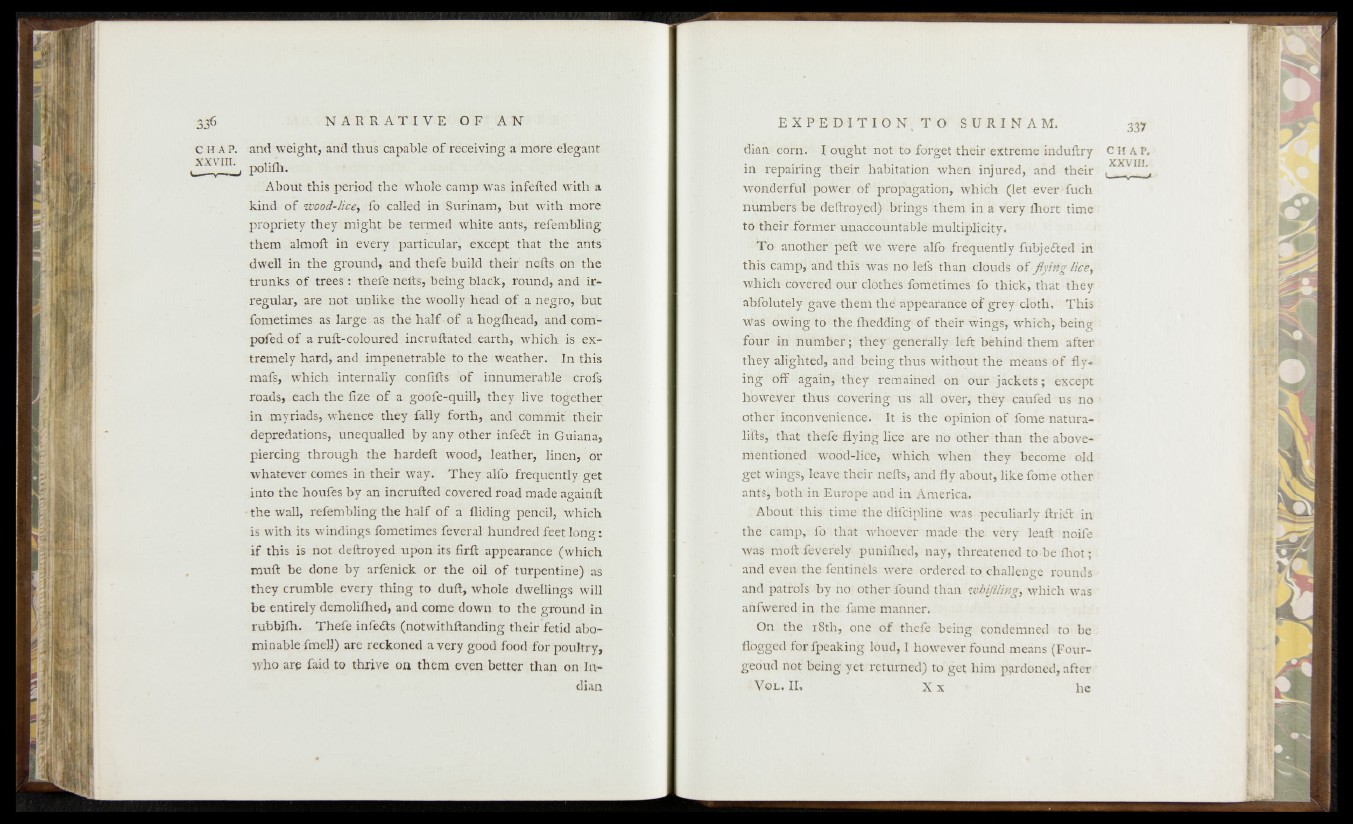
3ÉS N A R R A T I V E O F A N
>i|E
c h a p , and weight, and thus capable o f receiving a more élégant
polifli.
About this period the whole camp was infefted with a
kind o f wood-lice, fo called in Surinam, but with more
propriety they might be termed white ants, refembling
them almoft in every. particular, éxcept that the ahtsT
dwell in the ground, and thefe build their nefts on the
trunks of trees : thefe nefts, being .black, round, and ii>
regular, are not un like the woolly-head; o f a negro* but
fometimes as large as the half -ô f a Kogfheâd, apd com-
pofed o f a ruft-coloured incruftated^earth, which i‘s extremely
hard, and impenetrable to the weather.' In this
mafs, which internally conflftsf 'of innumerable Crofs
roads, each the fize o f a- gdofe-rquill, they live' together
in myriads, whence they Tally forth, and Commit their
depredations, unequalled by any other infecft fn| Gùiàha',
piercing through- the hardeft wood, leather, ilinen, or
whatever comes in their way. They alfo frequently get
into the houfes by an incrufted covered road made againft
-the wall, refembling the half o f a Hiding pencil, ‘whieh
is with its windings fometimes feveral hundred feet long :
if this is not deftroyed upon its firft appearance (which
muft be done by arfenick or the oil o f turpentine) as
they crumble every thing to dull, whole dwellings will
be entirely demolifhed, and come down to the ground in
rubbilh. Thefe infe&s (notwithftanding their fetid abominable
fmelj) are reckoned a very good food for poultry,
who are faid to thrive on them even better than on Indian
E X P E D I T I O N T O S U R I N A M . 337
dian corn. I ought not to forget their extreme induftry CHAP,
in repairing their habitation when injured, and their , . *.
wonderful' power of-propagation, Which (let ever ' fuch
nhmbef s be deftroyed^#rings them in a very fhort time
to!their former unaCCWIntable multiplicity*
To another ' peft’ we' were alfo frequently fubje&ed in
thirSamp^ and thfe-was no lefs than-clpuds o f ftyidg lice,
which covered our clothes' fotnet-ifnes fo thick, that1 they
abfolutely- gave them the* appearance of grey cloth. This
Was dwirigto the fhedding' o f theif wings, which, being'
four in number; they" generally left behind them after
they*alighted, and being thus without the means o f flying
off again, they remained on our jackets; except
hbWe-Ver thus covering us all over, they caufed us no i
other inconVenienGe'.r It is the opinion of fome natura-
W M that thefe flying lice are no other than the above-
mentioned wood-lice, which when they "become old
get wings,"leave their nefts, and fly about, like fome other'i
ants, both, in Europe and in America.
About this time the diicipline was peculiarly ftridt in
the camp, fo that whoever made the1 very lCaft noife
was moft feverely. punilhed, nay, threatened to be (hot;.
and even the fentinels were ordered to challenge rounds
and patrols by no other found than wbtfiling, which was
anfwered in the fame maimer. ’
On the 18th, one of thefe being condemned to be
flbgged for fpeaking loud, I however found means (Four-
geoud not being yet returned) to get him pardoned, after
Vol. II, - X x he